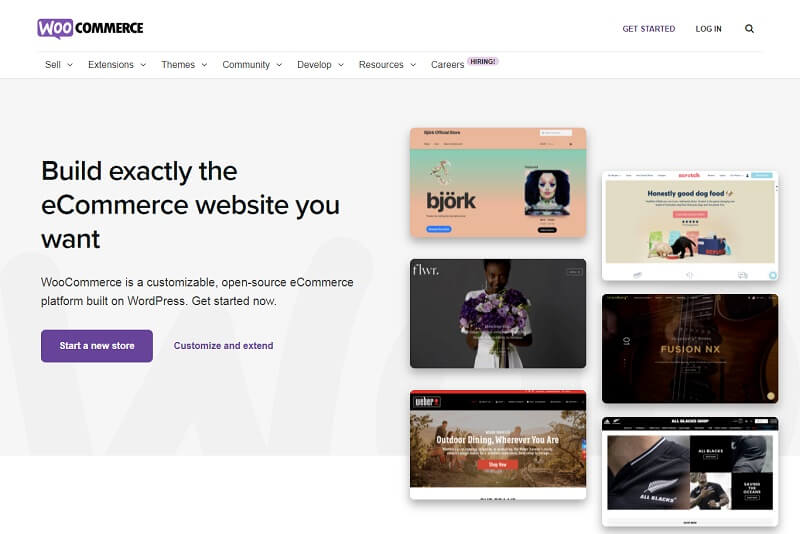
If you are looking for a new eCommerce platform other than Shopify, then this article is for you. In this article, you will find the best Shopify alternatives that may suit you.
As some of you may already know, Shopify is one of the most famous eCommerce platforms across the globe. It drives over a million web stores across 180+ countries.
Furthermore, Shopify is a cloud-based platform that lets you create a website, manage products, services, and their details, estimate shipping rates, and sell across multiple channels. You can use these free Shopify themes to build a successful online store.
However, because something is famous does not imply that it’s always the best solution. Shopify also has some drawbacks, like charging an additional transaction fee if you do not use Shopify’s in-house services and not having an instant inventory feature. Therefore, people are searching for an alternative.
Here are some of the best Shopify alternatives that you can use.
Table of Contents:
1. WooCommerce
2. BigCommerce
3. Shift4Shop
5. Wix
1. WooCommerce

Woocommerce was developed and launched by Automattic in September 2011. It is an open-source platform that has high visitor gauging due to its simplicity.
After buying hosting, you can easily build mobile-friendly websites with WooCommerce. Websites created on WooCommerce are quick and responsive, making it the most reliable Shopify alternative.
Furthermore, Woocommerce is also available as a WordPress plugin that is easy to install, customize, and integrate with any existing WordPress site.
However, this platform’s downside is its scalability. Once your business grows, you will need to buy paid plans for advanced functionality.
Apart from that, it is a great platform that offers you everything you need to build and run a website.
This powerful platform has both free and paid versions. The free version includes all the basic features you need to build a website, whereas the paid version offers more advanced value-for-money features and functionalities. The WooCommerce plans start at $199/year.
Pros:
- Sell limitless products on web store.
- Thousand of free extensions.
- 24*7 quality customer support
- No additional transaction fees.
- Easy to use and customize.
- Easy integration with existing WordPress websites.
Cons:
- No free SSL certification and domain Hosting.
- Site performance is affected when you add an extra core feature.
- Require tech skills, such as HTML, CSS, etc., to use the eCommerce store more efficiently.
- Need dedicated hosts for fast hosting.
2. BigCommerce

BigCommerce is another free Shopify alternative. It is a NASDAQ-listed eCommerce platform that provides traders software-as-a-service (SaaS) services.
BigCommerce also offers a wide range of cutting-edge features to improve content marketing and allow you to promote the products in various ways that boost conversion rates.
In addition to this, the open SaaS platform BigCommerce also has quite good scaling and flexibility. For upscaling your business, it is a promising Shopify alternative.
Furthermore, this powerful platform has a wide range of themes. However, you can only access limited Themes across all web stores. If you want more premium themes, you have to spend a little of your fortune.
BigCommerce is best if you want to expand and scale your business. The pricing of BigCommerce starts at $29.95 per month for the Standard plan and $79.95 per month for the plus plan. The Plus plans cover all the features of the Standard Plan.
Pros:
- Impressive SEO capacity.
- Customizable URLs.
- Multiple payment gateways.
- Ideal for mid and large businesses.
- No hidden transaction fees.
- World-wide selling channels.
- Drags and drops visual editing tools.
Cons:
- Difficult to install and set up.
- Five free themes only.
- Complex than Shopify due to its variety of features.
3. Shift4Shop

Shift4Shop is a highly secured, Cloud-based eCommerce platform. This feature-packed platform offers you SaaS services and unlimited product storage.
In addition to this, Shift4Shop’s flexibility and scalability are top of the chart. It is a cheaper Shopify alternative for building the perfect eCommerce website for a business and selling products or services online.
Furthermore, Shift4Shop’s turnkey eCommerce solution has a feature-rich website builder, customer marketing tools, product and order management, and many more. It also includes In-House Web Design Services and supports 70+ secure payment gateways.
The pricing of the Shift4Shop plan starts from $19, which includes SEO tools, tracking, Facebook sync, coupons, abandoned cart email, drop shipping, etc.
Pros:
- No hidden transaction fee.
- Decent SEO capabilities.
- Unlimited product storage.
- In-House Web Design Services.
- 70+ payment gateways.
Cons:
- Outdated themes.
- Poor services.
- No product search option.
- Poor Customer support.
4. Adobe Commerce

Adobe Commerce is another one of the best Shopify alternatives. Powered by Magento, this open-source eCommerce platform has a broad network of developers who deliver additional functionality.
Furthermore, it also has established communities across the globe to help beginners and new users. Adobe Commerce is best for building multi-channel marketing experiences for B2B and B2C clients on a single platform.
Again, Adobe Commerce offers modern, drag-and-drop tools for quickly building compelling shopping experiences and content without the need for developer support.
In addition, Adobe Commerce provides access to a safe, large partner ecosystem for third-party apps and add-ons. This popular free platform is best for all kinds of businesses.
Also, if you have adequate developing knowledge and skills, you can do any customization you like with the right code.
Pros:
- Lots of free extensions and APIs for web service.
- Large community support across the world.
- Safe large partner ecosystem for third-party apps and add-ons
- Fair scalability and flexibility.
Cons:
- Need hosting.
- The high overall cost for the complete setup.
- Technical coding skills for high customization.
5. Wix

The last Shopify alternative on our list is Wix. This popular e-commerce platform is becoming more popular because of its simplicity and easy-to-use interface.
Furthermore, Wix lets you access a wide range of apps, templates, customizable themes, and sleek editors. Wix mostly works on drag-and-drop HTML.
This Shopify alternative is free to install and use. With Wix, you can create a website in two ways: by ADI(Standard) or by Wix Editor(user-customized).
It is perfect for both advanced and beginner users. Therefore, Wix could be the best Shopify alternative for you if you have yet to gain website-building experience.
The pricing plan of Wix basic plans starts at $3/month with the ability to connect to another custom domain and 20GB storage. The Business Unlimited plan starts at $4/month, while Business VIP comes at $7/month.
Pros:
- Marketing automation.
- Free domain in premium plans.
- 24*7 customer support.
- Easy to use interface.
- Drag and drop builder.
- Free templates and themes
Cons:
- Poor Upscaling capabilities.
- Weak AWS integration.
- Limitation on traffic and bandwidth.
- Limited storage of 50GB.
- Poor SEO capabilities.
Conclusion:
There are lots of eCommerce platforms out there that you can use as a Shopify alternative. Shopify is a popular eCommerce platform, without a doubt.
However, it sometimes does not fulfil the user’s requirements. You can use one of the platforms listed on our list.
Compare their features, price, pros, and cons, and pick the best platform that suits your needs. Furthermore, if you have any further questions regarding the topic, you can ask me in the comment section below.

